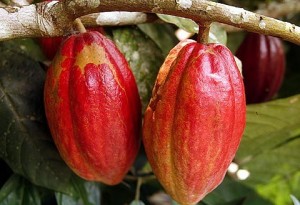COCOBOD says it’s unhappy about women’s share of cocoa profits
 The Ghana COCOBOD has expressed worry that women farmers in the country do not receive equal share of profits from cocoa income, despite their significant contributions towards the growth of the nation’s cocoa sector.
The Ghana COCOBOD has expressed worry that women farmers in the country do not receive equal share of profits from cocoa income, despite their significant contributions towards the growth of the nation’s cocoa sector.
Mrs Faustina Elikplim Aberor, the Bono, Bono East and Ahafo Regional Extension Officer, Cocoa Health and Extension Division (CHED) of the COCOBOD said women were actively engaged in all stages of cocoa production – nursing, weeding, planting, harvesting, breaking of pods, fermentation, and drying.
“Interestingly, the woman disappears from the scene at the selling point”, a situation she noted, saying if women’s potentials are fully harnessed, they would be able to contribute significantly to the socio-economic development of the nation.
Mrs Aberor raised the concerns during the launch of the “Women for Change” (W4C), a project initiated by Care International, an NGO with funding from Mars Incorporated, in Sunyani.
Overall objectives of the five-year project are to “expand village savings and loan initiatives in Touton cocoa communities and beyond to strengthen financial literacy, household savings, and income-generating activities for women”.
This would make a great impact on the lives of women cocoa farmers in 122 cocoa growing communities in Bono and Ahafo Regions.
Mrs Aberor indicated Ghana’s sector, the largest foreign exchange earner, was composed of about 888,000 small-scale farmers with 30 per cent being women, and underlined the need to provide even playing field in the sector to enable women to increase control of their lives by becoming independent and autonomous.
This, she added would reduce high levels of poverty in several cocoa-growing areas, rectify gender anomalies in the cocoa sector, and enhance efforts towards eliminating the worst forms of child labour in the sector.
Mrs Aberor described the implementation of the W4C project as welcoming news saying “when cocoa-farming households gain access to financial skills and tools, women can engage in entrepreneurship, increase gender equality that would enable cocoa-farming households achieve economic resilience and improved livelihoods”.
Giving an overview of the project, Mr Marshall JB Anala, the Project Manager of Care International explained the project, was expected to end in September 2025, and would benefit 27,000 women within cocoa farming communities.
He said it required support from key stakeholders such as traditional authorities, Ministry of Food and Agriculture, Districts and Municipal Assemblies to make it achieve desirable outcomes.
Last year, Mrs Mercy Nyamikey, Senior Manager, Cocoa and Private Sector Initiative, Care International, said the NGO reached 1,046,913 people directly and over 3.1 million people indirectly to support their food and nutrition security and resilience to climate change
She added 53 per cent of the direct reach were women, adding her NGO reached 174,775 women and girls to promote their access to and control of economic resources.
“We also reached 1,000 people to support women’s rights to sexual, reproductive, and maternal health, indirectly benefiting a further 4,000”, Mrs Nyamikey added.
“Our approach prioritizes implementing effective human rights due diligence processes in collaboration with partners and supporting community- based investments and development programmes in the areas of women’s empowerment, education and income”, Madam Berlinda Addison-Ansah, the Sustainability Programme Officer, Mars Incorporated stated.
“Cocoa is not only one of the key ingredients of our world-renowned chocolate brands, it is central to the livelihoods of an estimated 350,000 cocoa farmers in our global supply chain”.
“We depend on cocoa farming communities, and this mutual relationship drives us to continuously strive to create a sustainable cocoa supply chain where human rights are respected, and everyone has the opportunity to thrive”, Mad Addison-Ansah added.
Source: GNA
